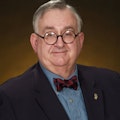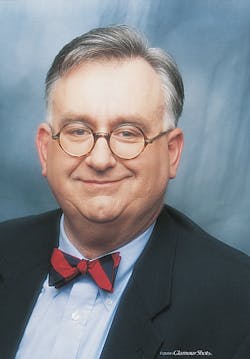Command Post: Going for the Gold: Learn How to Listen
I recall an article I read in the Star Ledger newspaper of Newark, NJ, that dealt with the assertion that the best leaders generally are good listeners. This was very interesting to me because I am by nature a very bad listener.
Years ago, I took part in a two-day oral examination process for the job of fire chief in a large city in the Midwest. I felt I did very well, but because I had to leave town immediately after the final interview, I missed the debriefing session that was held for each candidate.
About a week later, I received a telephone call from one of the lead assessors. He said I placed in the top three on the list of candidates and debriefed me on my participation in the different exercises. He indicated I had done well on each part of the examination and received the highest oral interview grade.
Then he explained why I had not placed first on the list. It was because my listening skills were not all they could have been. He said I tended to interrupt people before they completed their thoughts and that I had a habit of completing other people’s phrases.
Had I been a better listener, I may well have been the fire chief of that city 20 years ago.
Active listening
Since then, I have worked diligently to be a better listener. I have had some successes and some failures. I am probably better now, but backsliding can occur at any time.
Why do we have to be a good listener? Because, if you are trying to talk while someone else is attempting to express their thoughts, you may miss someone else’s good idea. Some of the best things that have ever happened to me came as a result of advice from a friend or a suggestion from a stranger. If I had not been listening, I would have missed their thought.
In our textbook Management in the Fire Service, fourth edition, Erwin Rausch and I write, “…officers need to be aware of their listening competence, so they can practice, reflect, assess their strengths and weaknesses, and improve their habits.” We stress that listening is a two-way street. For listening to be effective, some action must occur.
We all need to be aware of the true nature of listening. In our textbook we add, “…effective listening occurs at two levels; passive and active listening. Passive listening is merely paying attention to what the speaker is saying. Active listening includes empathy and the responsibility for understanding the speakers full thought. Active listening requires two-way communications.” You have to work at it.
Active listening is a skill you can learn. What do you have to work on? Here is a short list I have memorized:
1. Always look at the person to whom you are listening.
2. Concentrate on the ideas being proposed to you.
3. Avoid framing your response to the speaker while he or she is still talking.
4. Listen to what you are saying.
5. Do not speak until the other person has stopped talking.
I once worked with a man who never let me finish a sentence. It was very difficult to communicate with him because he was always talking and never listening. Of course, it gave me the opportunity to practice my skills as a listener. It also forced me to focus because I never knew where a conversation was headed. Much was lost by the lack of full two-way interaction.
Many years ago, I had an appointment with the chief of the Memphis, TN, Fire Department, the late Edward Hamilton. It was 1970, and I was a U.S. Air Force firefighter stationed in Arkansas. I was thinking of staying in Memphis after my separation from the service. I had several friends who wanted me to join them on the fire department and were working behind the scenes to make this happen.
They all gave me the same advice: Chief Hamilton, they told me, is a no-nonsense person and he appreciates a person who looks him right in the eye and pays close attention to what he is saying. I did as I was told and the interview went well. Of course, once my days in the service were over, I did what most people do when they are released from active duty – I returned home with a speed approximating that of light. But I took the look-him-in-the-eye lesson of my meeting with Chief Hamilton home with me. It has served me well over the past four decades.
An area often overlooked in discussions about listening involves monitoring non-verbal clues. What people do and how they act can give you a clue as to whether they are actually listening. I once was in a meeting at which my boss spent more time glancing at his watch than listening to me.
There is also the “bright sunny day syndrome.” You are talking with someone who instead of listening to you is looking out the window at the first robin of spring landing on a tree limb. And how many times have you tried to talk with someone only to be interrupted by the ringing of a telephone? On more than one occasion, my train of thought has been derailed by a runaway telephone.
Let me sum up this way: People like to talk. But more importantly, people like to be heard. If you want to succeed as a leader, make listening skills part of your permanent character and ethical portfolio. You have to become a better listener one conversation at a time. Go for it.
Dr. Carter shares his perspectives in his “The View From my Front Porch” blog at:
http://www.firehouse.com/blogs/the-view-from-my-front-porch.
HARRY R. CARTER, Ph.D., a Firehouse® contributing editor, is a fire protection consultant based in Adelphia, NJ. He is chairman of the Board of Commissioners in Howell Township Fire District 2 and retired from the Newark Fire Department as a battalion commander. Dr. Carter has been a member of the Adelphia Fire Company since 1971, serving as chief in 1991. He is a life member and past president of the International Society of Fire Service Instructors and life member of the National Fire Protection Association. He is president of the United States of America Branch of the Institution of Fire Engineers (IFE) of Great Britain. Dr. Carter holds a Ph.D. in organization and management from Capella University in Minneapolis, MN.
About the Author

Dr. Harry Carter
HARRY R. CARTER, Ph.D., who is a Firehouse contributing editor, is a fire protection consultant based in Adelphia, NJ. He is chairman of the Board of Commissioners in Howell Township Fire District 2 and retired from the Newark, NJ, Fire Department as a battalion commander. Carter has been a member of the Adelphia Fire Company since 1971, serving as chief in 1991. He is a life member and past president of the International Society of Fire Service Instructors and life member of the NFPA. He is the immediate past president of the U.S. branch of the Institution of Fire Engineers (IFE) of Great Britain. Carter holds a Ph.D. in organization and management from Capella University in Minneapolis, MN.
Connect with Harry:
Email: [email protected]
